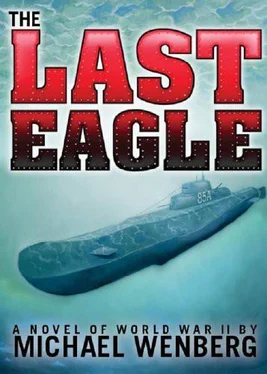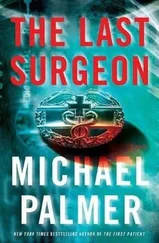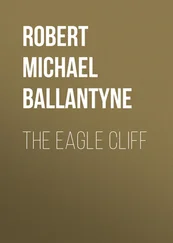“He was a sailor,” Talli said. “He knew….”
Stefan’s mouth was a straight line. In a way, it changed nothing. Stefan still despised Sieinski and all that had made him the way he was. And yet, at the end, he was a captain in deed as well as title. Stefan touched the tip of his cap in final salute.
Ritter watched with curiosity as the motor yacht raced out of nowhere, approaching the submarine. At first he assumed it was the Estonian harbor authorities, attempting to persuade the Eagle to give way and stop. But when the yacht turned away from the submarine and raced toward the freighter, he began to worry. As seconds passed, and the yacht quickly closed on the freighter, his alarm increased. “Shoot, you fools,” he screamed finally, his voice ragged and hollow in the predawn darkness.
A moment later, the light from the muzzles of a dozen rifles began to wink along the railing of the freighter.
There was no change, however, in the yacht’s course. Of course, what could a motor yacht do? He tried to assure himself. It was an empty gesture. A craft of wood and glue against a monstrosity of iron and steel a hundred times its size.
Ritter felt himself calm as he watched the last moments. He pulled out a cigarette, lit it and then exhaled at the same moment the yacht disappeared beneath the freighter’s stern. There was a momentary flash of fire as the fuel tanks detonated, and then nothing else. It had been futile. He wondered who had been piloting the motor yacht. A local anti-Nazi partisan? Not likely. Someone from the Eagle’s crew staying behind to sacrifice himself? Again, not likely. He had watched the way Stefan treated his crew more like family than sailors. He would no more leave someone behind than a father would leave behind a son. Whoever it was must have known he wouldn’t survive the impact. He had to be prepared for death with nothing to lose.
Ritter continued to watch the race, relaxed now, smoking casually. When he finished his cigarette, he would jog over to the Estonian Naval Headquarters and settle it all with Admiral Kalm. At the moment, he was enjoying the spectacle, and the time alone.
And then the worst began to happen. The freighter’s bow wavered and then with agonizing slowness, it began to turn away from the harbor opening.
“No,” Ritter whispered in disbelief. He flipped his cigarette into the water. Somehow, the yacht had damaged the freighter after all. It gave the Eagle the chance it needed. Now it had an open shot to the sea.
There was only one thing left to do. Destroy the submarine. She couldn’t be permitted to escape. That had been clear from the outset.
It was almost as if Ritter gave the order. There was a flash followed by a loud crack from the harbor battery on the nearby bluff. Ritter held his breath and then exhaled when a plume of white spray erupted into the air, 150 meters short and another 75 meters behind the Eagle .
The Eagle shifted course slightly and seemed to hunker down lower in the water like a jaguar dropping her head and then running for her life. Her deck gun fired in response, but the shell exploded against the side of a building far short of the harbor battery.
Ritter clenched his fists as he watched all that he had worked for, all that he had dreamed about, begin to dissolve before his eyes. He had been so close, within mere hours of taking over control of the vessel. And now this, she was on the verge of escaping, or worse yet, being destroyed.
Though it wasn’t technically his fault, how would he explain it Dönitz? He had carried out the entire plan with meticulous precision only to falter at this last moment. Ritter shook his head. Enough time later for recriminations.
It had been a risky plan from the start. In some sense, it was amazing they had gotten this close. Of course, that wouldn’t matter to the Dönitz, or Hitler, for that matter.
The Estonian guns on the harbor’s other side opened fire. The results were the same—a column of spray shot into the air. Another miss. The crack of the big guns, firing now with persistence, sounding like thunder rolling across the harbor and town. Behind him, all the buildings were ablaze with light. Everyone in Tallinn was awake, watching the show.
Still the Eagle continued to streak for the harbor opening, her passing marked by a trail of white foam.
Two more shots, two more misses, the shells striking rock and concrete on the harbor jetty instead of the submarine’s iron skin. Closer. But Ritter could see they were too late to zero in on the submarine. Or perhaps they were missing on purpose. He would never know. The remaining shots were acts of futility. Ritter watched the Eagle race past the jetty, disappear into the night. He sighed heavily, turned on his heels, and began to trudge away. The Eagle was gone.
He didn’t get far. A moment later, a dark black Mercedes, identical to the one Ritter had left destroyed on the streets of Tallinn, glided to a stop on the quay. The head of the Estonian Navy, Admiral Kalm, stepped out of the car. His face was puffy from lack of sleep. He licked his lips and said, “We did what we could.”
Ritter shook his head with mock regret. “I’m afraid I will have to report otherwise to my superiors.”
“What of my,uh, remuneration?”
“Ah, yes. Of course, good intentions count for nothing. Since we received nothing, you will get nothing.”
The admiral sagged and then caught himself. “I will talk to Dönitz.”
Ritter laughed. “By all means. Please do. You’re a fool if you think it will do any good. I did everything including handing you the submarine on a silver platter, and now you let it get away.” Ritter stepped closely, his face inches from Kalm’s nose, who too, his credit, did not back away. “You’re lucky I don’t kill you right here,” Ritter breathed, a sudden flush of rage rushing through his body. And then the moment passed and he stepped back, cocking his head with a sudden thought. “Take me to your headquarters,” he ordered. “I need to make some new arrangements.”
The head of the Estonian navy bowed his head in acknowledgement, held open the door for Ritter, and then climbed in after him.
The drive back to the headquarters was short. Ritter didn’t mind. He had already dismissed that pig of an admiral. He would pay. Not now, of course, but later. The Reich had a long memory.
As for Ritter, he would pay as well. It was as he expected. But before that time came, he still had a few options. Of course, it would require the services of a German destroyer, but under the circumstances, that might not be hard to come by.
Moments after he had learned the news of the Eagle’s escape from Tallinn, Dönitz was summoned by Hitler.
He trotted down the granite steps at German Naval Headquarters two at a time and slipped into the back seat of the waiting Mercedes without bothering to acknowledge the driver who was holding open the door for him. Across the street, a gaggle of children were crowded around the sausage vendor, clamoring for food like young birds in a nest. One boy’s face was already smeared with mustard. He caught Dönitz eyeing him, and smiled without restraint, holding out the bratwurst in his fist as if to say, “Can you imagine anything as wonderful as this?” And then Mercedes pulled away from the curb.
Dönitz wasn’t surprised that Hitler already knew about Eagle . He had expected to be called in for an explanation. He just hadn’t expected the call so soon. Even so, he wasn’t worried. There was little to the operation that Hitler could find objectionable, except the outcome, of course. It had been a risky operation from the start, but it had cost little terms of men and material, so the benefits had been worth the risk.
Читать дальше












